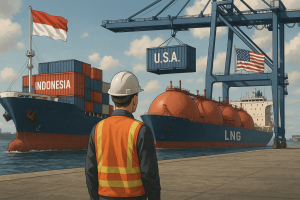An expert has called on the government to carefully consider its plan to import up to US$15 billion worth of oil and gas from the United States on the grounds that the move could significantly increase logistics and insurance costs.
Komaidi Notonegoro, Executive Director of the Reforminer Institute, said that most of Indonesia’s petroleum oil imports currently come from neighboring countries like Singapore and Malaysia. The U.S., by contrast, ranks 21st in terms of petroleum oil imports, contributing only US$19 million in 2024. However, in the category of petroleum gas, the U.S. has emerged as Indonesia’s top supplier, with imports reaching US$2.03 billion in 2024 − up from US$1.55 billion in 2023.
“Jumping from US$2 billion plus US$19 million in 2024 to US$15 billion in imports from the U.S. will inevitably shift the share away from other countries,” Komaidi said in a statement on Thursday, July 24, 2025.
He noted that the surge in imports could either replace supply from existing partners or increase overall volume. If the latter, Indonesia must evaluate its domestic storage capacity, which remains limited.
Komaidi emphasized the logistical challenges: oil and gas shipments from regional suppliers in Africa and the Middle East usually take around 10 days, while deliveries from the U.S. − especially from Texas − could take 30 to 40 days. Prolonged shipping times could strain national reserves, which currently last a maximum of 23 days.
“If the vessel hasn’t arrived after 30 days, we risk running out of domestic stock. This is a critical issue,” he said.
He also highlighted insurance costs, which would rise significantly if shipments transit through high-risk areas like the Gulf of Mexico.
Additionally, there are geopolitical implications to consider. Singapore, Indonesia’s top petroleum oil supplier and one of its largest investors, could react unfavorably to being sidelined.
“Singapore is a major source of oil and investment for us. Shifting away from them needs to be handled with care,” Komaidi warned.
The only way to make U.S. imports more competitive, he said, would be through lower pricing or using swap arrangements involving U.S. oil companies operating in closer regions, such as Singapore.
“We still don’t know the details of the U.S.-Indonesia deal. It’s possible the oil won’t come directly from the U.S., but from American firms like Exxon operating in other countries,” Komaidi added.
The potential redirection of imports from Singapore and the Middle East to the U.S. also reflects the enduring importance of oil and gas in Indonesia’s economy − despite the global push for energy transition.
“In an era where fossil fuels are often labeled as a ‘sunset industry,’ this move highlights how vital oil and gas still are for Indonesia’s economic stability and trade diplomacy,” Komaidi concluded.
